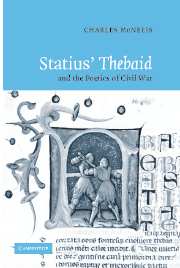Introduction
Published online by Cambridge University Press: 22 September 2009
Summary
On his journey through the ninth circle of Hell, Dante sees the Guelph Ugolino, who had been locked in a tower with his sons and starved to death, eating the head of his captor, the Ghibelline Ruggerio (Inferno 32.124–33.78). At the start of the scene, Ugolino is likened to Tydeus (Inferno 32.130–1), a character from Greek mythology who horrifically gnawed the skull of his foe Melanippus. The comparison illustrates a persistent feature of Dante's artistry, namely that he accentuates the brutality of the atrocities committed in the internecine warfare that was plaguing Florence by evoking scenes from Statius' Thebaid. In fact, Dante transforms Statius' Thebes into a ‘metaphoric textual model’ for Hell. Later in the Commedia, however, Statius himself appears to Dante and Virgil as they proceed through Purgatory, and he is compared to Christ joining the two disciples on the road to Emmaus (Purgatorio 21.7–9). As the three epic poets continue their journey, Statius explains some of the workings of Purgatory and of the soul, and even accompanies Dante through the Earthly Paradise (Purgatorio 32.29). Dante thus plainly distinguishes Statius the salvific poet from his hellish Thebaid. In employing the literary past in such a way, Dante emphasizes the division that underlies both the Florentine civil war and the distinct components of his poem about Heaven and Hell.
- Type
- Chapter
- Information
- Statius' Thebaid and the Poetics of Civil War , pp. 1 - 24Publisher: Cambridge University PressPrint publication year: 2007



